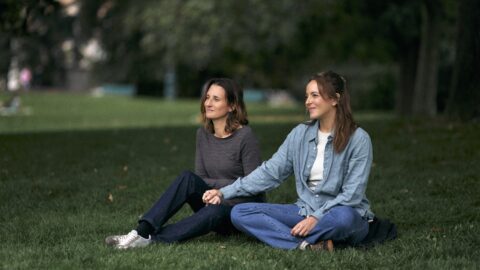Out of Love (Nathan Ambrosioni, 2025) reminds me of many different French social realist women’s dramas that often plague the plages of Cannes, offering actresses the chance to flex their skills in a realist, tightly-wound setting. Here, Camille Cottin has her big chance at a meaty lead role, pulling in a full range of emotions as a woman battling both internal struggle and a complex surrounding world.
And yes, the storyline and bureaucratic structures are familiar to anyone with a passing interest in French cinema. Yet with this film, Ambrosioni displays a remarkable level of technical craft. Although there is little here that is technically flashy, every single camera and editing choice, as well as the lived-in performances of the entire cast, elevate this drama above the standard and into something truly touching — even profound.
Cottin is Jeanne. One day, she is working from home when her sister Suzanne (Juliette Armanet) turns up with her two children. A widow at just 37 years old, Suzanne mentions being exceptionally tired of motherhood, looking to the withdrawn workaholic Jeanne for comfort. The next day, she is gone, leaving Jeanne alone with two children and no idea how to become a mother figure for them.
Cottin plays Jeanne as a smart yet complicated adult, able to fully understand the importance of her role as a newfound mother to these children but also holding onto delusions about her interpersonal relationships and her sister’s intentions. It’s how Cottin navigates her character’s blinkered yet almost there self-awareness that makes this such a rich film, allowing us to observe her emotional thawing over the course of just under two hours.
The familiar hallmarks of French social drama are here — useless cops, paperwork mazes, legal quagmires, paradoxical relationships — but the real joy lies in the way that the film is framed and edited. Take a date night between Jeanne and her on-and-off-again ex-girlfriend turned occasional lover Nicole (Monia Chokri). The sentimental, powerful chats between them are filmed almost exclusively in intense close-ups, but when Nicole reveals something that changes their relationship forever, the film cuts to a wide shot, allowing for a stylistic correlative to this terrible news.
Likewise, a moment where Nicole processes another emotional setback is all shot in the same medium distance shot, allowing for a sense of connection as well as a certain measure of distance, showing how we can understand her pain, but she is still left to suffer alone. These are just two examples of how this film has evidently storyboarded and executed every scene with a real sense of purpose, with nothing pointless or superfluous involved. This is especially refreshing when much of social realist cinema these days involves dull handheld camerawork and more lazy camera coverage than a Club World Cup game.
And all this wouldn’t mean much if the screenplay wasn’t so smartly attuned to the push and pull of makeshift mothering, the plainness of the dramatic structure and stakes laying the stage for the camerawork and acting to shine, to often rather affecting results.
Not everything works — at times the film threatens to go in a more thriller direction before not properly committing, while some of the supporting cast are criminally underused. But these are more or less minor issues. At the mere age of 25, Nathan Ambrosioni shows a remarkable sense of emotional maturity, intuitively understanding the lives of women far older than himself. And this amazing fact is trumped by his own background story, having directed his first feature, Hostile (2014), at the age of just fourteen. Absurd! Xavier Dolan better watch out.
Redmond is the editor-in-chief of Journey Into Cinema.

